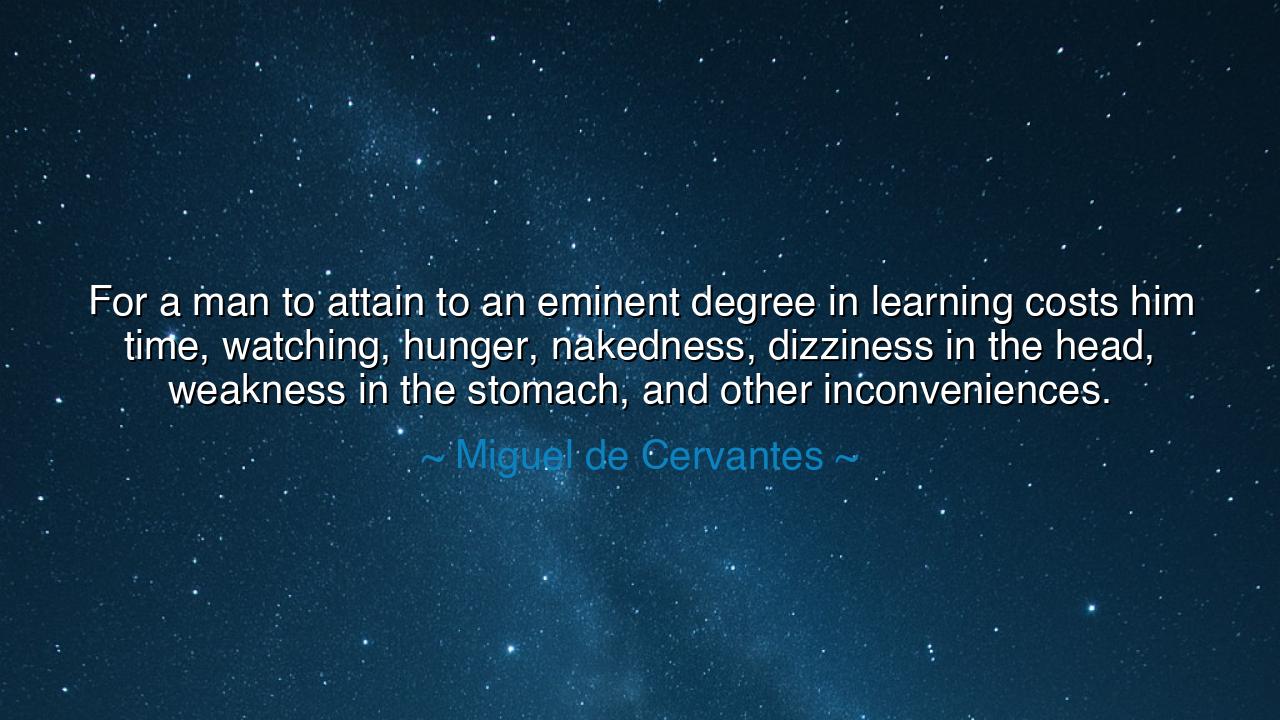
For a man to attain to an eminent degree in learning costs him
For a man to attain to an eminent degree in learning costs him time, watching, hunger, nakedness, dizziness in the head, weakness in the stomach, and other inconveniences.






The words of Miguel de Cervantes — “For a man to attain to an eminent degree in learning costs him time, watching, hunger, nakedness, dizziness in the head, weakness in the stomach, and other inconveniences.” — are not merely an observation, but a testament to the sacred cost of wisdom. Spoken by a man who himself endured poverty, imprisonment, and war, these words burn with authenticity. They speak of the truth that all who seek greatness in learning — not mere knowledge, but true understanding — must pay a price that is far beyond comfort. For learning is not granted; it is earned through struggle, discipline, and the quiet suffering of the soul that longs for light.
Cervantes, the author of Don Quixote, knew these “inconveniences” intimately. His life was no tale of privilege or ease. He was wounded in battle, captured by pirates, enslaved for years in Algiers, and later struggled in poverty while writing the work that would immortalize him. In every hardship, he learned the truth of his own words — that to rise to an eminent degree in learning demands not only the intellect, but the endurance of spirit. For wisdom, unlike wealth, cannot be stolen or bestowed. It must be forged in the furnace of experience, where hunger and fatigue become teachers, and patience becomes the first virtue of the scholar.
There is in his reflection the echo of an ancient lineage of seekers who have walked this same path. Socrates, the wise man of Athens, was known not for his possessions, but for his poverty; he declared himself rich only in knowledge. Epictetus, born a slave, learned philosophy in chains and taught that the soul’s freedom mattered more than the body’s ease. Cervantes, centuries later, spoke in the same tongue — that the pursuit of learning is not a leisurely journey through books, but a pilgrimage of sacrifice, where the mind must wrestle with its own limits, and the heart must grow steadfast against despair.
His mention of “hunger” and “nakedness” is not mere metaphor. It is the reality of those who have devoted themselves wholly to the pursuit of truth — the poets who starve for their art, the philosophers who live in solitude, the scientists who burn through their nights in relentless observation. Consider Galileo Galilei, who defied the doctrines of his age to reveal the motion of the heavens. For his learning, he was imprisoned and silenced, yet he endured — and through his suffering, the light of modern science was born. So too with Cervantes: his own hunger birthed one of the most profound works of human imagination, proving that deprivation may sharpen the soul rather than diminish it.
This quote, then, is not merely a lament but a praise of endurance. It tells us that the road to mastery is strewn with trials that test the body and purify the will. The dizziness of the head, the weakness of the stomach — these are the signs not of failure, but of devotion. They are the physical manifestations of a mind that refuses to rest, that hungers for understanding even when the world offers no reward. For in the realm of the spirit, effort itself is sacred. The true scholar, the true seeker, is one who endures these “inconveniences” not for fame or fortune, but for the simple, unyielding love of truth.
In this way, Cervantes speaks across time to all who would learn — that knowledge demands sacrifice, and that ease is the enemy of wisdom. To those who would walk the path of understanding, he offers both warning and blessing: that the cost is great, but the reward is greater. For what is gained through struggle cannot be lost through chance. The man who has learned through hardship possesses a treasure that no thief can take — the treasure of resilience, humility, and insight.
So let this be the teaching, O listener: do not fear the cost of learning. When your nights grow long and your mind grows weary, remember that every hour of struggle builds the foundation of your strength. When hunger comes, let it sharpen your vision; when loneliness surrounds you, let it deepen your thought. Know that all who have ever achieved greatness — whether in letters, in art, or in wisdom — have passed through this same trial. The inconveniences of learning are but the birth pangs of enlightenment.
For in the end, Cervantes’ words remind us that the path of the intellect is not for the faint-hearted. To seek truth is to suffer a little; to gain wisdom is to surrender comfort. Yet through that sacrifice, one emerges transformed — no longer merely learned, but wise, no longer merely alive, but awake. And this awakening, costly though it may be, is the noblest victory a human soul can attain.






AAdministratorAdministrator
Welcome, honored guests. Please leave a comment, we will respond soon